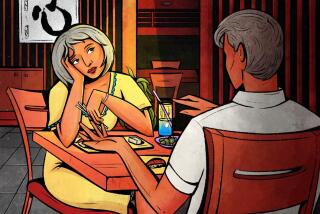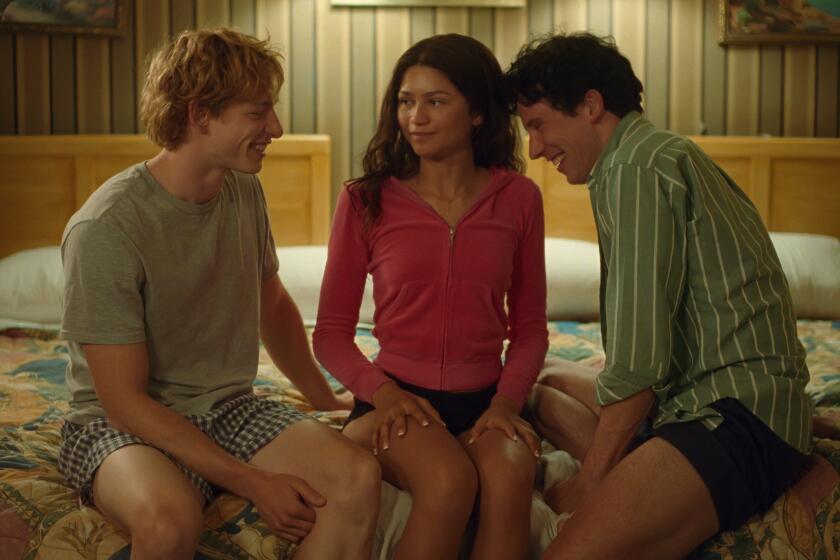Discoveries: Three titles provide unexpected Valentine’s reading
Jealousy
The Other Life of Catherine M.
Catherine Millet
Translated from the French by Helen Stevenson
Grove: 182 pp., $23
Catherine Millet’s last book, “The Sexual Life of Catherine M.,” caused a bit of a stir -- the voyeuristic thrill of nodding sagely as we watch another open relationship go up in smoke and too many mirrors. So Millet is pushing her luck with a sequel: We get to watch her writhe and rip her hair out when she finds herself actually in love enough (or is it love?) to be obsessively jealous.
All snarkiness aside (oh, just one more -- enough about my sex life, what do you think of my sex life?), you have to admire her willingness (reminiscent of memoirs by Simone de Beauvoir and Annie Ernaux) to show herself raw -- to gaze and gaze into the holy navel until she finds something we might all actually learn from (or not). Millet meets Jacques when she is 24. She discovers a letter (no!) revealing the depth of his involvement with someone else. Trouble with open relationships, she writes, is “that you are not the only one who has a special relationship with them” (no!).
I admire her self-esteem and her lack of self-esteem, both. We turn away from the childishness and ugliness of jealousy and the incompleteness it reveals. It’s hard, unless you’re Chauncey Gardiner, to watch.
Lunch in Paris
A Love Story With Recipes
Elizabeth Bard
Little, Brown: 352 pp., $23.99
Another boring Valentine’s Day? To stimulate a violent mood swing, read “Jealousy” and then this frothy confection of a memoir. Ask yourself which head you’d rather live in: Millet’s tortured, desperate search for pleasure or Elizabeth Bard’s la-di-da? Bard is a self-confessed multi-tasking, tightly coiled, New York worrier. Not the girl “who swings from the chandeliers and screws men because she can, fixing her lipstick in the rearview mirror of a cab hailed at dawn” -- instead she’s the “girl you call Wednesday for Saturday.” There’s a bit of self-deception going on here, since she ends up sleeping with the handsome Gwendal about 30 seconds after she meets him.) Their affair begins with deftly made mint tea and matures into profiteroles, tagines and macaroons. They marry in 2003. A friend worries about her declining ambitions: “You can’t spend the rest of your life at the market,” the friend tells Bard. “I didn’t have the courage to say it out loud just yet,” Bard thinks, “but a tiny voice popped up inside me: why not?”
Supernormal Stimuli
How Primal Urges Overran Their Evolutionary Purpose
Deirdre Barrett
W.W. Norton: 206 pp., $24.95
Bit of a downer, actually. Turns out all that pain and jealousy, mint tea and tagines aren’t, strictly speaking, necessary. Deirdre Barrett, an evolutionary psychologist, explains in her new book “Supernormal Stimuli” how instincts that may have served us 10,000 years ago are no longer useful. We try to fill false needs with super-sized symbols of power (atomic weapons), frantic permutations on sex and, well, sugary foods (seems like excessive weight gain may be the lesser evil here).
Barrett recommends willpower (just say no to candy and leaders who tell us we have to kill people in other countries). Listening to our instincts and doing what makes us happy, contrary to popular opinion, is not the reliable way to do the right thing.
Salter Reynolds is a writer living in Los Angeles.
More to Read
The biggest entertainment stories
Get our big stories about Hollywood, film, television, music, arts, culture and more right in your inbox as soon as they publish.
You may occasionally receive promotional content from the Los Angeles Times.










